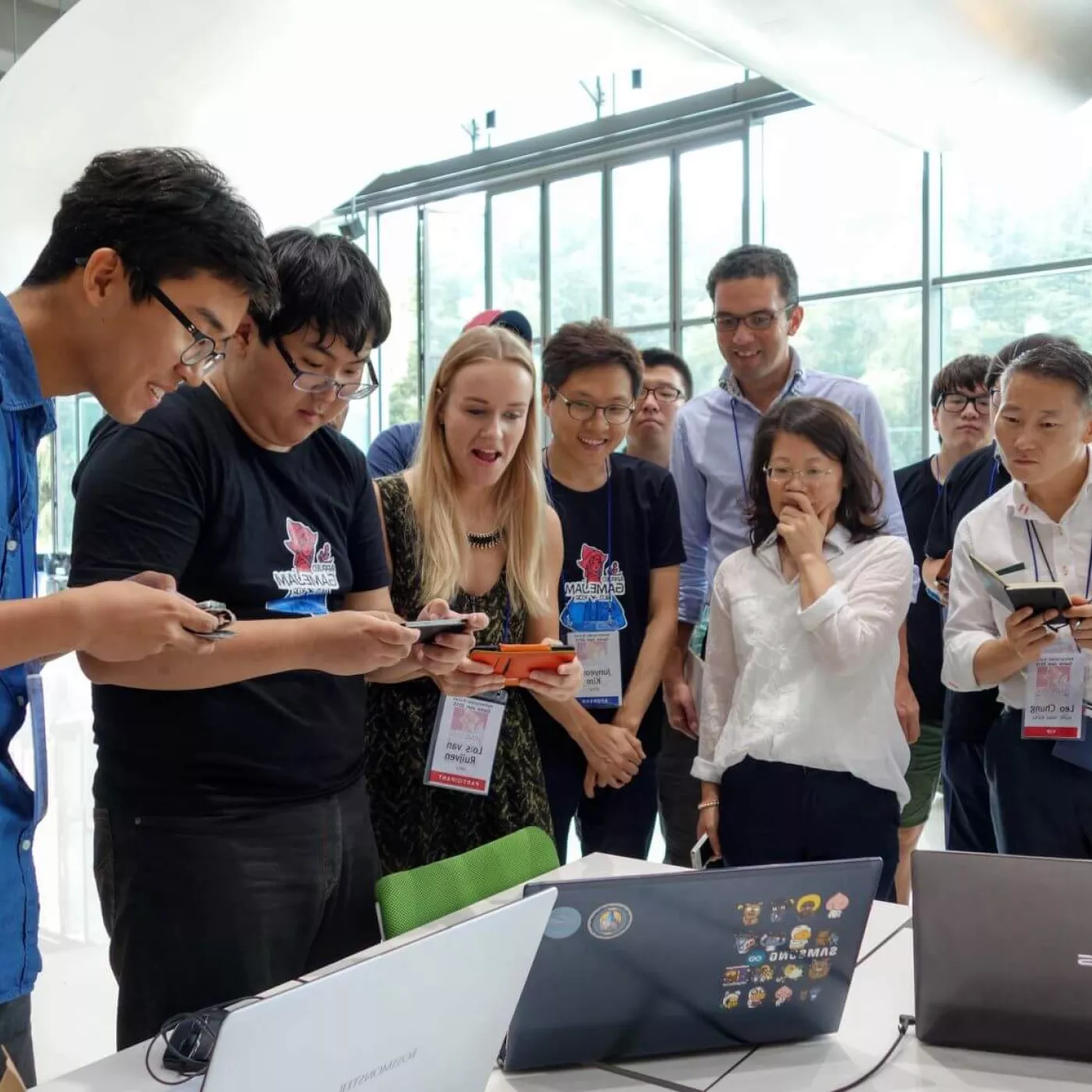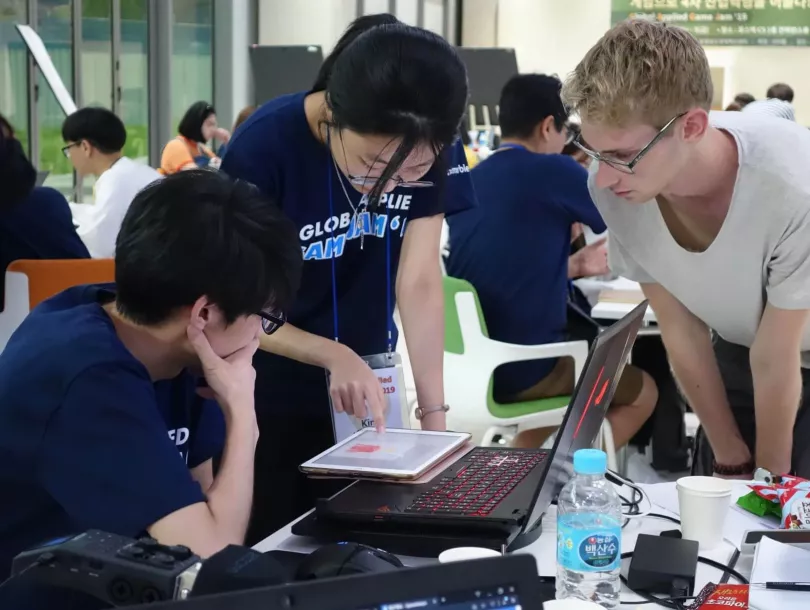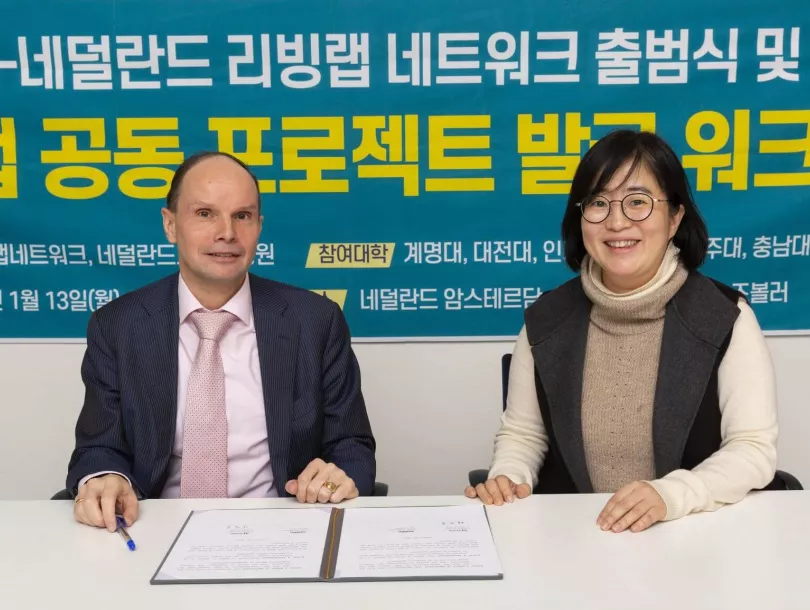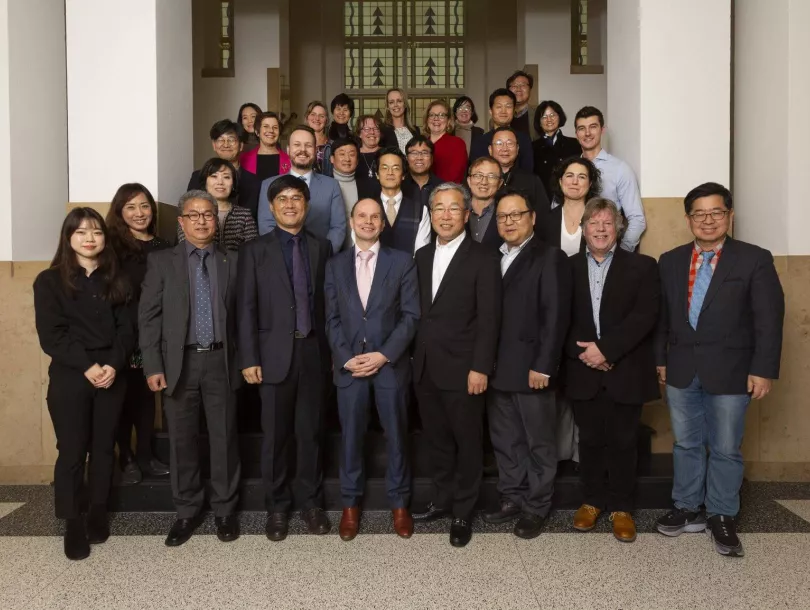"With Koreans, you always get things done"

Subjects of Living Labs vary widely, ranging from sustainability and food security to ageing and disability inclusion. But no matter the theme, “we are looking for real-world issues to which government or industries haven’t yet found an answer and for which several parties are needed”, explains Niels Keetels, lecturer and leader of the internationalisation efforts at HKU University of the Arts Utrecht.
HKU University of the Arts Utrecht organized its first Living Lab with Postech University in Pohang, South Korea, in 2013, and has been expanding collaboration with Korean institutions ever since. Today, HKU has Living Lab projects with fourteen universities (albeit indirectly, mostly through Postech). Each year, about ten to fifteen HKU students join their Korean counterparts in so-called ‘Applied Game Jams’, in which they have 48 hours to create an interactive game that contributes to the solution of complex social issues.
Dementia
The reason HKU has chosen games as its way to give substance to Living Labs is that ‘participatory media’ like games are a proven method to make users think and question assumptions. For example, during a Living Lab about workplace inclusiveness, students created a game that could easier be won when including a disabled person in the (virtual) workforce. In another year, students came up with a game with cognitive practices for elderly people in order to slow down dementia.

"A big part of the excitement of Living Labs is the collaboration with students from different countries."
“Obviously, a big part of the excitement of Living Labs is the collaboration with students from different countries”, says Keetels. “Korean and Dutch students are especially excited to work together, because they share the same values and work ethic. Jokingly, I sometimes call Koreans ‘the Dutch of the East’. If you come to Korea with ambitions, you will probably find someone that shares those ambitions, and is willing to work with you. With Koreans, you will always get things done.”
Roundtable and matchmaking
That outlook is shared by Jeong-Sang Lee, Professor of Biotechnology and Functional Foods at Jeonju University in Korea. “The Dutch and Korean people are quite similar, both are extremely diligent”, Lee says. “As a result, working together in projects tends to go very smoothly. In addition, Koreans like the Dutch people and ways because they are always looking for innovative ways to solve problems.”
Lee was part of a delegation of Korean universities that recently visited the Netherlands. The trip included a visit to Nuffic’s headquarters in The Hague, since Nuffic, through its Neso offices, acts as a facilitator of international institutional collaboration. Over the last few years, cooperation between Dutch and Korean institutions has increased significantly, and this ‘roundtable and matchmaking session’ – the second of its kind in six months – underlines this development.
"Living Labs give students a meaningful way to contribute to society."

Besides Jeonju University, participants represented the Regional Innovation Center, Inje University, Jeju National University, Daejeon University, Keimyung University, Chungnam National University and Hanbat National University. Present from the Dutch side were Amsterdam University of Applied Sciences, Aeres University of Applied Sciences, Fontys University of Applied Sciences, The Hague University of Applied Sciences, Hanze University of Applied Sciences, NHL Stenden University of Applied Sciences, Windesheim University of Applied Sciences and Nationaal Regieorgaan Praktijkgericht Onderzoek SIA-NWO.
Han Dommers, Member of the Board at Nuffic, and responsible for student mobility and talent retention, was also in attendance, in addition to Jinjoo Kang, Second Secretary at the Korean Embassy, and Jungyoon Yang, Chief Representative of Neso South Korea.
Learning by doing
The universities met in The Hague to explore new Living Labs collaborations. Opportunities abound, since the Korean government actively supports these initiatives through LINC+ (Leaders in Industry-University Cooperation). In November of 2019, LINC+ launched the Korean Living Lab Network in which 34 universities are participating. “Living Labs are about learning by doing”, says Lee. “It gives students a meaningful way to contribute to society.”
“I have always thought that to build a sustainable society, universities should lead the change”, adds Deog-Seong Oh, President of Chugnam National University. “Together with Dutch universities, the Korean Living Lab community can make things happen. This meeting will expand the cooperation between Dutch and Korean universities even more.”
Competitive
One of the reasons Living Labs are boosting creative thinking and innovation is because of their competitive nature. Students work on the same challenges, but in competing teams. And because Living Labs are sometimes sponsored by companies, the winning team may be awarded with a substantial prize. Last year, members of the winning team of one Living Lab all took home a brand-new smartphone.

Over the last few years, cooperation between Dutch and Korean institutions has increased significantly.
Yet the new perspectives gained by all participants by fair outweigh any prize or trophy, says Niels Keetels of HKU. “Our students learn that our Dutch methods of designing, even those held in the highest regard, do not always apply in other countries. Different people approach topics very differently.”
The games produced by HKU and Korean students have led to numerous internship and exchange opportunities for students, and multiple scientific publications for the institutions involved. Living Labs even lead to job opportunities. Multiple Dutch Living Lab participants are now working and living in Korea and there is an increase of Korean students studying in the Netherlands.
Start small
Although eventually plenty of opportunities may arise out of Living Labs for all participants, it always starts at the drawing board with an idea or challenge. “Start small, but think big”, is the advice of Monica Veeger (Fontys). “Also, don’t forget about investing in relationships. In the Netherlands we are very task-focused, which makes it easy to lose sight of relationships.”
But during the meeting in The Hague, relationships and matchmaking were front and center. Im Choong Jae, Professor at Keimyung University: “We have seen that both sides are willing and able. Now it’s up to all of us to prepare for the next step.”
In Nuffic's podcast series Our People Abroad, Jungyoon Yang, Chief Representative at Neso South Korea, discusses the differences between Dutch and South Korean culture.